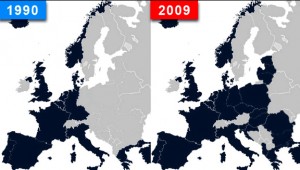TFF PressInfo: Cold War warnings 1998 – 2014
By Jan Oberg
Lund, Sweden August 11, 2014
Quality research leads to better predictions
One criteria of quality research is that it predicts the future better than incompetent research.
Because TFF is independent of governments and coroporations it doesn’t have to take political considerations or exclude certain theories, concepts or values. This free research enabled it over the years to make fairly precise predictions about for instance former Yugoslavia, the Iraq war and East-West relations.
In 1998 – 16 years ago – we warned that NATO’s expansion would lead to future problems with Russia. Read it here.
NATO should never have been expanded
We backed this prediction up with 46 arguments and argued that so many other things would be wiser than containing Russia from the Baltic republics to Georgia – a strategy pursued by Bill Clinton in contravention of all promises given to the Soviet Union/Russia at the end of the Cold War about ten years earlier.
That counterproductive and insensitive expansion has now hit Ukraine. A new Cold War is gathering over Europe. It should have been predicted by advisers, intelligence agencies, big research institutes and columnists.
But it wasn’t.
At the end of the Cold War, NATO/the West got everything it could ever wish – and without war. But it wanted more: keeping Russia down, making NATO bigger and “peace-making” as well as finding new enemies to keeping its Military-Industrial-Media-Academic Complex (MIMAC) alive and well: Saddam, Milosevic, the Muslim world, terrorism and – now re-cycling – Russia.
The East was always weaker
Those of us old enough to have lived under the old Cold War feel pain at witnessing today’s result of the post-1989 Western triumphalism and ignorance about all the alternatives to NATO and its expanson that the dissolution of the Soviet Union and the Warsaw Pact offered.
NATO was established in 1949, the Soviet Union sought membership in 1954 and was turned down, West Germany got into NATO the same year, and the Warsaw Pact was established – partly in response to that – in 1955. The East has basically been re-active.
Today, Russia’s military expenditures is about 8% of NATO’s. Unless you consider Putin mentally ill or suicidal, it borders on hysteria to militarize and expand NATO’s military further.
Not one NATO general would prefer to be employed in the Russian military.
The Eastern side has always been comparatively weak – militarily, economically, and in terms of global projection capacity. It is NATO that still runs the show – but it can’t do that without finding enemies to legitimize its policies with.
Blaming Russia only: Projection, pretext and escalation
While Russia with President Putin has its share in the present crisis – such as the annexation of Crimea and not securing autonomy for non-Russians there – it is exemplary psycho-political projection to blame and punish Russia for the present crisis.
To expand NATO and bring Ukraine into its orbit, you have to blame Russia and call it a big threat against which we gallantly provide Ukraine protection against.
This is delusional.
Russia did not cause the crisis in Ukraine as has also been argued convincingly by world renown American columnist William Pfaff.
In addition it does nothing but escalate the tension and make the road back to normalisation and co-operation even longer.
The West should show leadership in confidence-building instead of escalation
The latest provocative statement by NATO and the EU – to cover up for its expansion blunder and regime change in Kiev – is the argument that if Russia delivers humanitarian aid to Eastern Ukraine it will be considered an “invasion”.
This comes as the Ukrainian military – with the full support of the EU and NATO – is about to start a major offensive to re-take Donetsk and thereby cause an even larger humanitarian catastrophe.
Western-backed President Poroshenko obviously deceived everybody when he said he had a peace plan.
Russia will not start a war over Ukraine. It’s not in its interest, it doesn’t have the capacity to fight NATO as there is even less of a balance of power today than in the old Cold War days.
But it will react at some point to further attempt to bring NATO troops to its borders – as Washington would with Russian troops at the border with Canada or Mexico.
If so, there will be dark dark clouds over Europe for decades.
Freeze the escalation now: An All-Party Peace Process, APPP
Europeans everywhere should be deeply concerned about NATO’s and EU’s ongoing militarisation and expansion in this fundamentally a-symmetric conflict.
It is a safe prediction that not one European citizen will benefit from its consequences.
The only constructive way is to freeze the situation now, de-militarise instead of re-militarise, meet and talk – which is why TFF has already suggested an All Party Peace Process, APPP.
[812 words]

